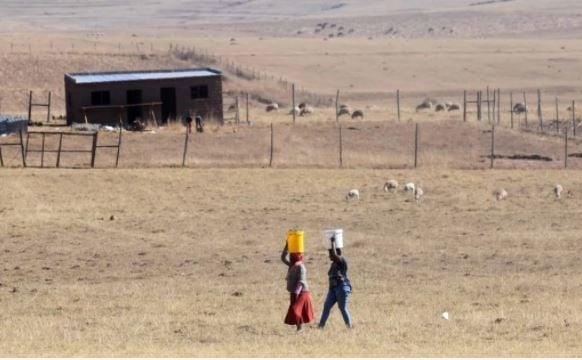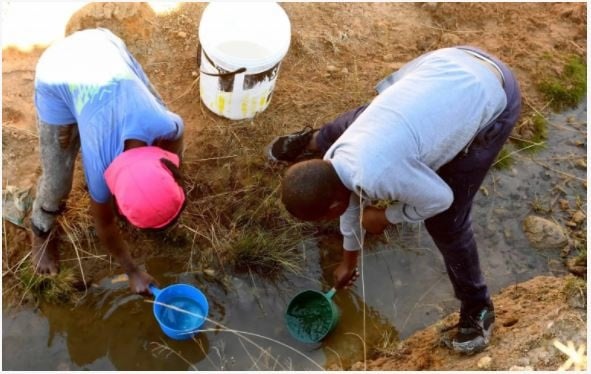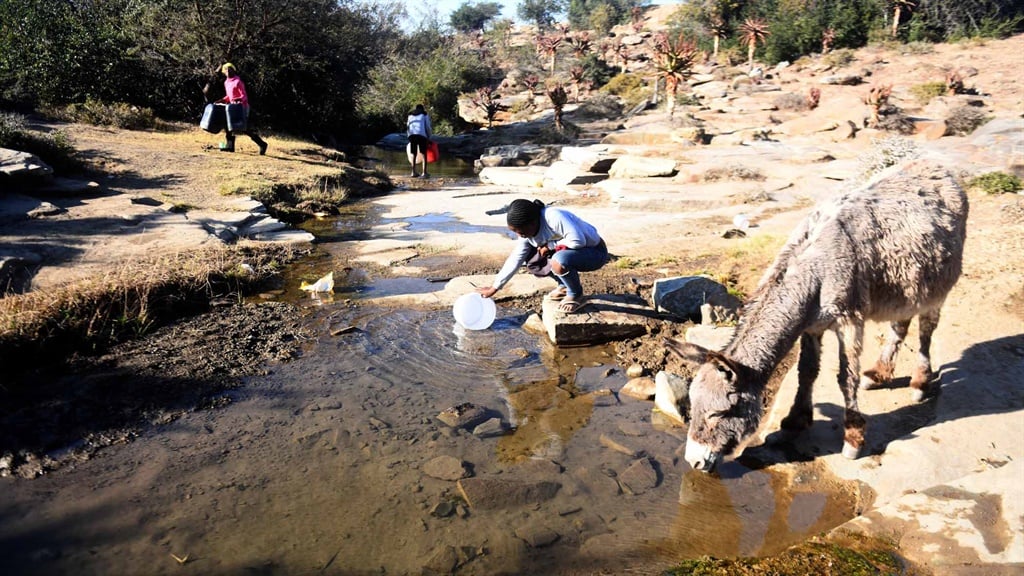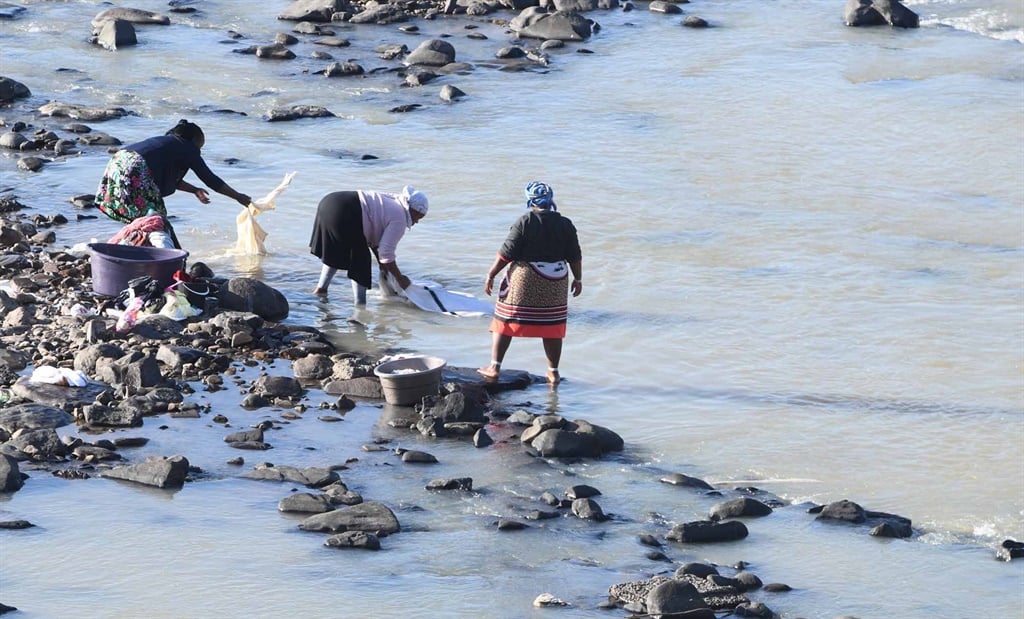
There are certain choices one should not be forced to make, especially if you are caught in a pandemic where personal hygiene is crucial to preventing and limiting the transmission of disease.
In certain areas of the rural Eastern Cape, however, thousands of residents are forced to make impossible decisions each day.
At the centre of these rural communities’ daily gamble for survival is access to clean water – a basic human right still out of reach for many.
Siyasanga Sodwana (33) has been fetching water from nearby rivers and dams for most of his life.
He says he is from a village he calls Intaba yeMission, about 30km from Mthatha.
Sodwana is one of the more than half of residents in the mostly (93%) rural OR Tambo district in the Eastern Cape who do not have water within 200 metres from their dwelling.
OR Tambo District Mayor Nomakhosazana Meth, in a presentation to Parliament’s portfolio committee on cooperative governance and traditional affairs (Cogta) in August, said access to below-minimum service levels in the district was pegged at 52%, and 28.2% of residents (households) still had no access to water services.
Access to water in the district deteriorated between 2011 and 2016, something the municipality attributed to “unreliable water sources which mostly dry up” back then.
When every drop counts
“Water is not for washing hands,” says Sodwana.
“This water is for us to eat. We travel about 20km [and] pass three villages on foot to get this water. So we can’t waste this water on washing hands.”
Having to make choices such as these puts many of these rural residents at risk of not just the Covid-19 coronavirus, but also other waterborne diseases including cholera.
In another village near Engcobo in the same district, Ludwe Nginingana tells Spotlight that residents in the area “always have stomach problems” from the water they access from nearby rivers. It is especially bad in the rainy season, he says.
“Covid-19 is a big problem, yes. We use hand sanitiser to wash our hands. When it’s finished, we wait until the next pay [grant] date and buy sanitiser. Water is scarce.”
In a province where many people depend on grants to get by, having to spend grant money on sanitiser forces difficult trade-offs.
Read: Could this handwashing station be the solution to SA’s hygiene problems?
The Eastern Cape Socioeconomic Consultative Council – an institution founded to forge meaningful partnership between government, business, labour and the non-profit organisation sector to address underdevelopment and poverty in the province – pegged the unemployment rate for the OR Tambo district at 35.5% in 2016.
Ayanda Leyi lives in a small village near Mthatha. He says water is “a big problem” in the villages.
“We don’t have roads, we don’t have water. This is the kind of life we are living, where old men and women walk through all these villages to get water in this place. This is our life. We drink this water, we cook, and we wash ourselves with this water.”
Parliament demands answers
In August, members of Parliament demanded answers from a delegation from the OR Tambo District Municipality. Instead they mostly got excuses and obfuscation.
Meth said the municipality spent R5.8 million on the appointment of 26 service providers with water tankers for three months to ferry water to communities with little or no access to water. This was part of the district’s Covid-19 relief efforts. The service providers would fill 888 water tanks across the district, she explained.
About 10km from the Nelson Mandela Museum in Mvezo, water tankers fitted with tanks, pipes and generators – presumably the municipality’s multimillion-rand tankers – are seen fetching water from the Mbashe River on some days.
In some far-flung villages, residents claim that they have never seen a tanker. Some villagers say they hire trucks and bakkies to fetch water for them.
In one village, which residents call Phantsi kweMission, they pay between R800 and R1 000 for a bakkie to fetch water for them.
For some, such as Grade 9 pupil Ndikhokhele Peter from Gqaka village, collecting water is an everyday chore. He uses two donkeys to help carry the water to the village.
In Qumbu, Zolile Hlazo (64) uses rainwater from his tank.
“When the rainwater is finished, we buy water from the water tankers or go to the other villages.”
But not everyone can afford this.
“The dam you see next to us, we drink this water with cows and horses. We boil [the water] so that we can drink.”
With fewer than half the population in the district municipality having access to inside or outside piped water, it would be fair to say that there are serious governance and service provision failures in OR Tambo.
During the committee meeting, DA MP Cilliers Brink called the situation at the municipality “a non-stop train crash of poor decisions and governance” because of its inability to curb water losses, poor revenue collection and deteriorating supply chain management processes that have cost millions in irregular expenditure over the years.
Meth attributed the poor revenue collection and other woes to Covid-19.
Ticking time bomb
Findings from the Auditor-General (AG) not only reflect MPs’ concerns, but also show how governance failures and poor water services management at a local level can cause a ticking public health time bomb which the country can ill afford, especially at the height of a global pandemic.
Shereen Noble, from the AG’s office in the Eastern Cape, told MPs that the municipality received consecutive qualified audits for the past five years.
The qualified audit outcomes are, among others, rooted in hundreds of millions in irregular expenditure because supply chain management procedures, as prescribed by the Municipal Finance Management Act, are not followed.
Noble said the AG noted that most areas in the district lacked sufficient water infrastructure and that most of this infrastructure was old and dilapidated.
“There are no standard procedures to assess the condition [of infrastructure]. The municipality is a water services provider, but it doesn’t have the capacity to investigate and maintain the infrastructure.
“This means the municipality struggles to get to all the areas they committed to give water infrastructure to,” she said.
Noble said there were not enough qualified engineers or technical staff who could routinely conduct infrastructure assessments. The AG requested information on vacancies in this area, but the municipality did not provide the information.
Meth told MPs that there were 1 249 filled posts and 1 103 vacant posts. She did not give a breakdown of the technical services staff vacancies.
“It is true. We need to reprioritise and look at water and sanitation vacancies,” she said.
Read: Ramaphosa pledges support to healthcare workers, urges SA to maintain hygiene practices
“This speaks to the [problems] with ageing infrastructure,” she said.
“We also couldn’t see that the municipal management did anything specific to improve the water quality during the year and we could not identify areas where it minimised further shortages of water and disruptions in the communities [which it is supposed to] serve.”
Millions are spent on water infrastructure projects with little or no benefit to communities.
During question time, ANC MP Phindisile Xaba-Ntshaba told the delegation that she was getting more questions than answers.
“In simple language, tell us what is it that you are doing to make the district a better place. People are drinking water with animals,” she charged.
EFF MP Khanya Ceza demanded that the Cogta MEC in the province investigate all executive members involved in water projects. He asked where the water tankers were in the district because residents still said they did not have water.
Serious health concerns
Portfolio committee chair Faith Muthambi earlier expressed the committee’s concerns over water problems in the Eastern Cape.
“This directly impacts the ability of communities to follow World Health Organisation protocols to combat the spread of Covid-19,” she said in a statement.
But Covid-19 is not the only concern. There are also broader public health concerns.
In many rural communities, the link between the lack of clean water and sanitation and avoidable health risks has been well established, making access to safe water a public health imperative.
In a largely rural district such as OR Tambo, the usual trip to the river, borehole or spring where rural communities without piped water fetch water often means humans share the water with animals, sometimes collecting it in unsealed plastic containers, and many women will do their washing there.
According to Dr Jo Barnes, epidemiologist at the division of community health at Stellenbosch University, this is a classic case of poor water access and unpurified water sources which can cause a huge disease burden in rural and semi-urban communities.
“Unpurified water can carry a large number of disease organisms,” says Barnes, “including organisms leading to severe diarrhoea, skin infections, and eye, ear, nose and throat infections, to name but a few”.
“When the water sources are further contaminated by animal waste, urinary tract infections and liver parasites are also a real risk.”
Barnes says the more people fall ill, the poorer the community becomes, setting off a vicious cycle of unsafe living conditions and unsafe hygiene leading to increasing poverty.
Some studies explored the safety of the typical containers which residents in rural communities often used to store drinking water.
It was found that where many residents often used polyethylene and galvanised steel containers for the storage of their drinking water, coliform bacteria and other microscopic organisms were present. This type of bacteria in drinking water can mean that there may be disease-causing organisms (pathogens) present.
In the absence of piped water, many rural residents depend on rivers and boreholes.
One study exploring boreholes in the Vhembe district in Limpopo showed that where boreholes are not maintained and where this lead to stagnant water damming up, there is a risk for contamination of the water source. So the safety of borehole water cannot be guaranteed.
An important observation in the study is that municipalities have a big role to play, especially in drawing up maintenance plans to ensure that all boreholes are functional and provide safe drinking water to rural communities.
*This article was produced by Spotlight – health journalism in the public interest.
| ||||||||||||||||||||||||||||||
 |




 Publications
Publications
 Partners
Partners













